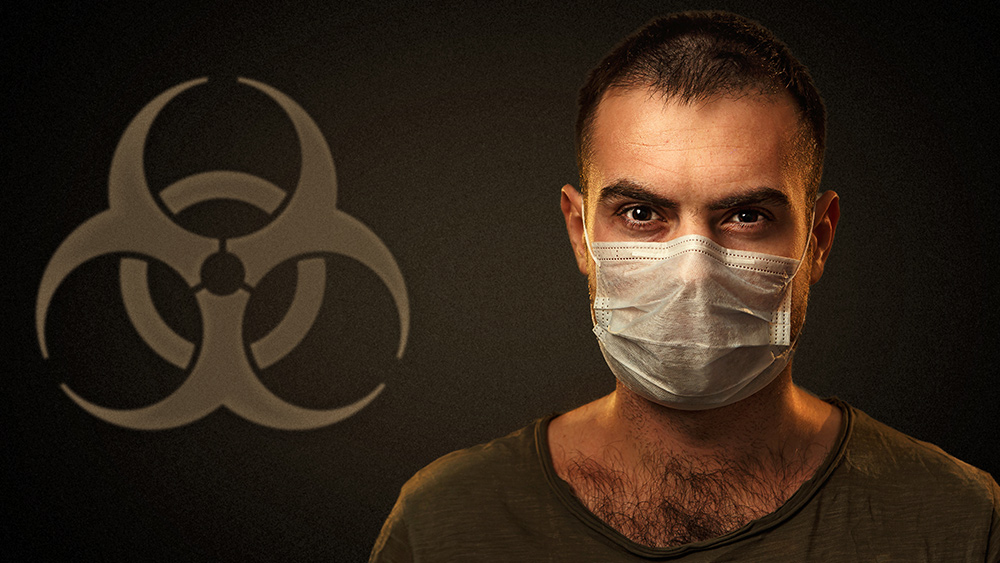A coronavirus outbreak in war-torn areas of the Middle East could cause massive upheaval in an already unstable region
04/21/2020 / By Arsenio Toledo

The Switzerland-based International Committee of the Red Cross (ICRC) has warned on Thursday that outbreaks of COVID-19 across conflict zones in the Middle East could cause massive upheaval in the already unstable region.
Millions of people in the Middle East live across multiple conflict zones; millions more are refugees or internally displaced persons fleeing from war. They are all destitute and living under uncertain conditions. If a massive COVID-19 outbreak were to come to Syria, Iraq or Yemen, for example, it could fuel dangerous “socioeconomic upheaval.”
The Red Cross has called for authorities all over the Middle East to prepare for the “socioeconomic earthquake” that will come once coronavirus starts spreading like wildfire across the more unstable parts of the Middle East.
“The Middle East is today facing the twin threats of potential mass virus outbreaks in conflict zones and looming socioeconomic upheaval,” said Fabrizio Carboni, Near and Middle East Director for the ICRC, in a statement.
“Both crises could have severe humanitarian consequences.”
In an interview, Carboni told reporters that the aftermath of COVID-19 wreaking havoc upon the Middle East could be worse than the pandemic itself because countries in the region will have to deal with the socioeconomic fallout.
“And it’s really scary,” said Carboni.
Middle East’s coronavirus curve unlikely to flatten anytime soon
As of press time, the most affected country in the Middle East is Iran, with over 82,000 confirmed cases of COVID-19, and over 5,000 deaths. This is followed by Saudi Arabia, with 9,362 cases, the United Arab Emirates with 6,781 and Qatar with 5,448.
The most unstable countries in the Middle East are still lagging behind, but this may be due to lack of testing capabilities.
“The number of laboratory-confirmed cases might be far less than the actual number of cases due to limited testing capacities in some countries,” said Ahmed Al-Mandhari, the World Health Organization‘s regional director for the eastern Mediterranean.
“Taking all these points into account, it is still too early to expect the case curve to flatten. We must be ready for all scenarios, and member states should always plan for the worst-case scenario.”
Are Iraq’s coronavirus fatality figures accurate? Reuters reported they were much higher, then had its licence suspended. President @BarhamSalih says there was no falsification of records, but that "I’m working together with our legal team in order to revoke [the suspension].” pic.twitter.com/ibBUtJwZlw
— Christiane Amanpour (@camanpour) April 14, 2020
In Iraq, which currently has 1,513 confirmed cases and 82 deaths, authorities have suspended the license of news agency Reuters due to clashes over a story they published, which states that the number of COVID-19 cases in the country is much higher than what is being officially reported, despite the fact that the news agency’s report cited three doctors working in or involved with the country’s testing facilities. Government officials have suspended Reuters for three months and ordered them to issue a formal apology.
Red Cross aid to the Middle East hampered by active conflicts
Yemen's misery seems endless. The country is already being ravaged by foreign forces. And now, the threat of #coronavirus looms large. It's an existential threat that no one truly cares about! @OSE_Yemen pic.twitter.com/a4J9rgOI1p
— Yemen Matters (@YemenMatters_) April 11, 2020
Yemen, which is also going through a civil war, confirmed its first case of COVID-19 on April 10. The six-year long civil war has “all but decimated” the country’s healthcare system, and experts have stated that the virus will further complicate an already disastrous humanitarian crisis in the country.
The ICRC said that half of the country’s health facilities are out of order, and the constantly shifting frontlines of the conflict are making it difficult for nonprofits to provide aid for the country. Carboni noted that despite the fact that they were trying to support many of the country’s hospitals, the “very active violence and conflict” has made it impossible to supply ventilators or intensive care units for critical patients.
Fortunately, Saudi Arabia and its allies have called for a unilateral ceasefire, which will last for two weeks, to help the Saudis combat their COVID-19 crisis.
Thousands of tents, millions of displaced people, and #coronavirus looms at their doors. This is the horrific reality of the northern #Syria after months of regime and Russian military campaigns against the Syrian people. pic.twitter.com/Hr3NUt45WZ
— The White Helmets (@SyriaCivilDef) April 16, 2020
When news broke of Syria’s first case of COVID-19 on March 14, the government initially denied it despite taking broad steps to prevent the spread of the virus, such as delaying elections, shutting down schools and canceling most public events in the country. Syria has millions of internally displaced persons living in crowded and unsanitary conditions in refugee camps all over the country.
Experts rightly believe that an outbreak of COVID-19 in the area would make things exponentially worse for the people living there, especially since the country’s healthcare system is already in ruins and the country has an ongoing conflict with Turkish-backed rebels in its northwest and northeast regions.
Carboni said that the ICRC has been able to provide Syria with hygiene kits and protective equipment, mostly for its 10 central prisons where overcrowding and unsanitary conditions make the possibility of an outbreak extremely likely. Carboni has said that the 10-year long conflict in the country has weakened its “collective response” to COVID-19, despite the fact that over a third of the ICRC’s regional budget for the Middle East is geared toward providing even more aid to the war-torn nation.
Carboni has said that millions of people in Syria are dependent on aid from nonprofits like the ICRC.
“It is true in Syria but it’s true in many countries affected by conflict, you need to work on both sides – the COVID emergency and the humanitarian crisis.”
Sources include:
Tagged Under: civil war, Collapse, conflict, coronavirus, covid-19, Flu, government, infections, Iraq, Middle East, outbreak, pandemic, Saudi Arabia, superbugs, Syria, virus, War, Yemen



















